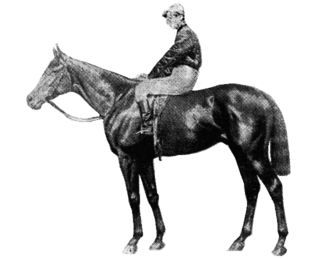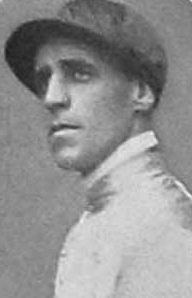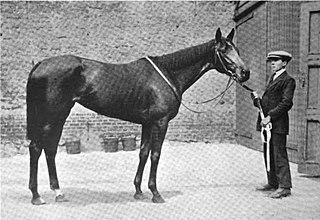
Pommern (1912–1935) was a British bred Thoroughbred racehorse and sire. In a racing career which lasted from 1914 to June 1916 he ran ten times and won seven races. As a three-year-old in 1915 he won the 2000 Guineas at Newmarket and the wartime substitutes for The Derby and the St. Leger Stakes to win a version of the English Triple Crown. After winning his only race as a four-year-old in 1916, he was retired to stud where he had limited success.

Black Jester (1911–1928) was a British Thoroughbred racehorse and sire, best known for winning the Classic St Leger Stakes in 1914. The colt won nine times from twenty-three races in a track career which lasted from 1913 until October 1915. Black Jester was one of the leading two-year-olds of 1913 when he won both Molecomb Stakes and the Richmond Stakes at Goodwood. As a three-year-old he finished third in the 2000 Guineas and was unplaced in The Derby before winning the Sussex Stakes at Goodwood and the St Leger at Doncaster in September. In 1915 he won the City and Suburban Handicap and the June Stakes, a wartime substitute for the Coronation Cup. He became increasingly difficult to train and at the end of the season he was retired to stud where he became a successful sire of broodmares.

Your Majesty (1905–1934) was a British Thoroughbred racehorse and sire, best known for highly unpopular wins the Eclipse Stakes and the Classic St Leger Stakes in 1908. The colt ran at least twelve times and won five races in a career which lasted from June 1907 until July 1909. Your Majesty was campaigned against the best of the year's two-year-olds in 1907 but won only once from five starts. The following season he finished unplaced in the 2000 Guineas and missed the Derby through illness. He then won four races in succession: the St. James's Palace Stakes at Royal Ascot, the Eclipse Stakes at Sandown Park, the St George Stakes at Liverpool and the St Leger at Doncaster. He was the leading money-winner of the British season but his successes were poorly received owing to the unpopularity of his owner. Your Majesty stayed in training as a four-year-old but failed to win. He was retired to stud where he became highly successful as a breeding stallion in Argentina.

Herbert Otto Madden was a four time British flat racing Champion Jockey

Joseph Childs (1884–1958) was a French-born, British-based flat racing jockey. He won fifteen British Classics in a 35-year career, the last ten years of which were spent as jockey to King George V. He was known for riding a slow, waiting race, and also for having a short temper which regularly saw him at odds with his trainers and owners.
Walter Earl (1890–1950) was a British Thoroughbred racehorse trainer. After a riding career of limited importance he became a private trainer, first for Solomon Joel and later for Lord Derby. He was one of the most successful trainers of the 1940s, sending out the winners of six classics and winning the title of Champion Trainer in 1945. His best horse was Alycidon who won the Ascot Gold Cup in 1949.
Lambert Simnel (1938–1952) was a British Thoroughbred racehorse and sire, who raced during World War II and was best known for winning the classic 2000 Guineas in 1941. As a two-year-old he won once and finished second in the Dewhurst Stakes In the following spring he won the 2000 Guineas, beating a field which included the subsequent classic winners Owen Tudor and Sun Castle. He was beaten when favourite for the Derby and finished unplaced in the St Leger. He won once as a four-year-old in 1942 before being retired to stud. He stood as a breeding stallion in England and Argentina with limited success before his death in 1952.
Harry or Henry Grimshaw was an English jockey, most famous for winning the British Triple Crown in 1865 on Gladiateur.

Thomas French (1844–1873), born in Liverpool, was a Derby winning English jockey.

Snow Marten was a British thoroughbred racehorse and broodmare. She showed promise as a two-year-old in 1914 when she won once and finished second three times from six starts. In the following year she finished unplaced in the 1000 Guineas but then recorded an upset win in the Oaks Stakes. She was placed in wartime substitute races for the Ascot Gold Cup and the St Leger and ended her racing career by finishing third in the Cesarewitch. As a broodmare, she had her biggest influence through her daughter Martha Snow who was exported to the United States.

Princess Dorrie was a British Thoroughbred racehorse and broodmare. As a two-year-old in 1913 she failed to win a race but was very consistent, finishing placed in seven of her eight starts. In the following year she was probably the best three-year-old filly in England, winning both the 1000 Guineas and the Epsom Oaks. She was retired at the end of the 1914 season and had modest success as a broodmare.

Kennymore was a British Thoroughbred racehorse and sire. He was a highly talented horse whose career was adversely affected by his difficult temperament. He did not appear until the autumn of his two-year-old season but made an immediate impact as he finished third in the Middle Park Stakes and then won the Dewhurst Stakes. In the following spring he won the Craven Stakes and the 2000 Guineas but lost his chance in the Epsom Derby when he became highly agitated before the start. He went on to finish third in the Eclipse Stakes and second in the St Leger before winning the Newmarket St Leger on his final appearance. He died at the age of five in 1916 after a single season at stud.

Norman was an American-bred, British-trained Thoroughbred racehorse and sire. He was exported from the United States as a yearling and showed some promise as a juvenile in 1907 when he won twice from nine starts. In the following spring he recorded a 25/1 upset victory in the 2000 Guineas. He was unplaced when favourite for the Epsom Derby and finished last in the St Leger but ended his second season with a victory in the Newmarket St Leger. He raced for another two seasons but never recaptured his classic winning form. He made no impact as a breeding stallion.
Canyon was a British Thoroughbred racehorse and broodmare. As a two-year-old in 1915 she won three races including the Bedford Stakes and the Bretby Stakes as well as finishing second in the Dewhurst Stakes. In the following spring she recorded her biggest win when defeating Fifinella in the 1000 Guineas. Canyon failed to win again but after her retirement from racing she became a very successful broodmare, whose offspring included Colorado and two other major winners.

Canterbury Pilgrim (1893–1917) was a British Thoroughbred racehorse and broodmare. She showed some ability as a juvenile but failed to win a race. She won the Oaks Stakes on her first run as a three-year-old and went on to win the Liverpool Summer Cup, Park Hill Stakes and Jockey Club Cup before being retired at the end of the year. As a broodmare the best of her offspring was Swynford, a top-class racehorse who was even better as a breeding stallion. She also produced the influential sire Chaucer and several good broodmares. She has been described as "one of the most influential horses, stallion or mare, of the Twentieth Century".

Fred Lane was a French-born, English-based flat racing jockey, who won the 1932 Derby among other big races.
Eric Ephraim Smith was an English flat racing jockey, who rode over 2,000 winners, including the winners of three Classics, in a career spanning over 30 years. He was three times the British flat racing Champion Apprentice and was ranked 23rd in the Racing Post's top 50 jockeys of the 20th century.

Frederick Edward Rickaby was an English flat racing jockey, who won three fillies' Classics. He is usually referred to as Fred Rickaby Sr. to distinguish him from his son and grandson, both successful jockeys in their own right.

Henri Jelliss was a Belgian jockey and trainer, who won three British Classics as a jockey in the 1920s and 30s and a further one as a trainer in the 1940s.

Pat Beasley was an Irish-born, English-based Classic-winning jockey and racehorse trainer.















